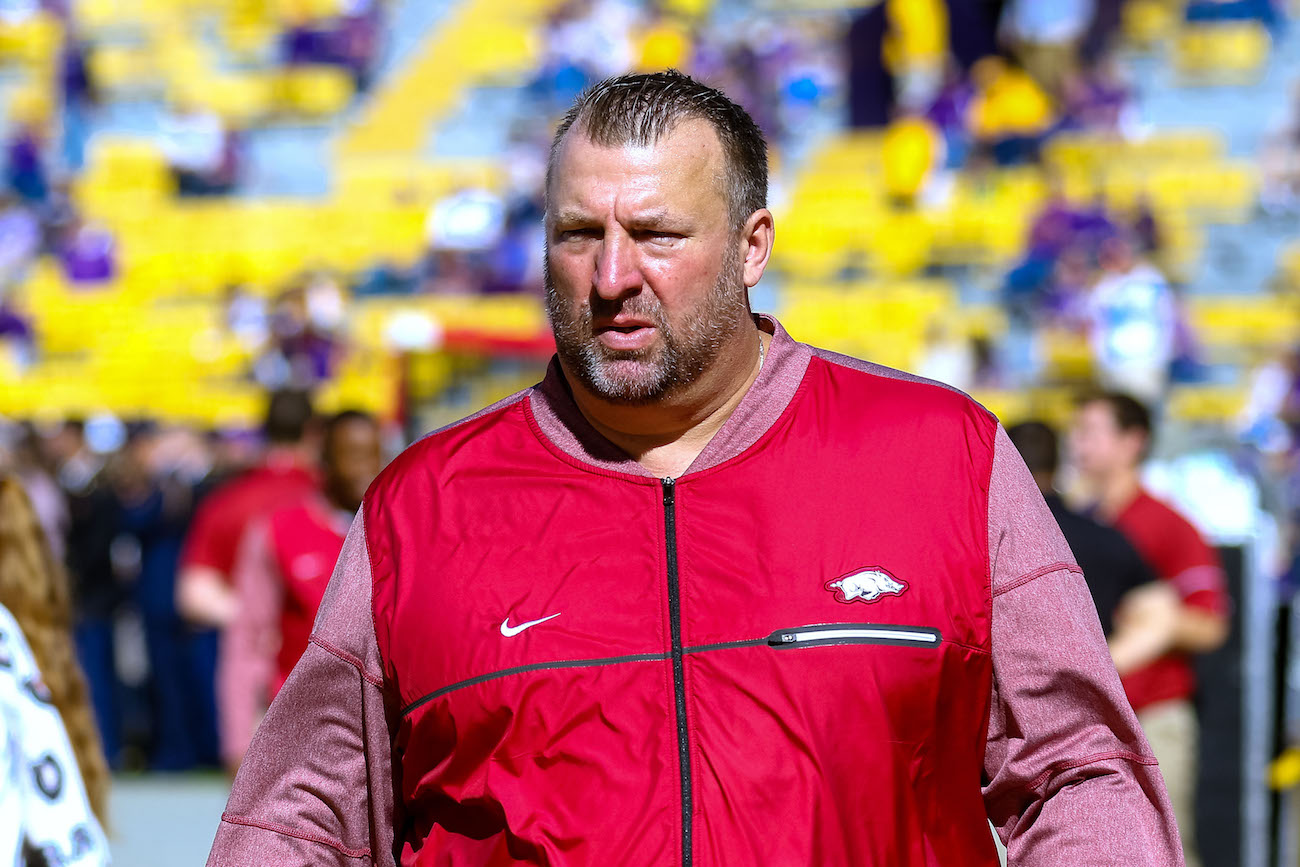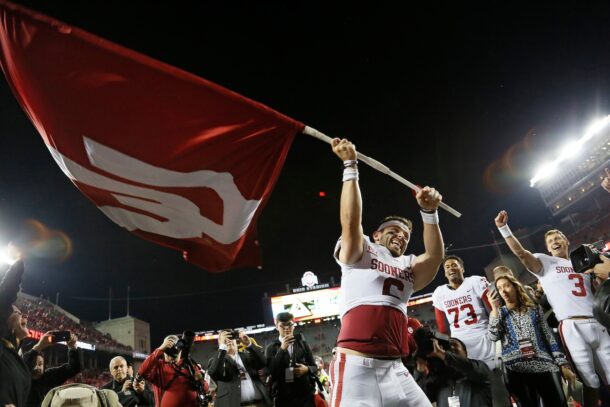
Bret Bielema deserves what Arkansas owes him, and universities deserve a reality check
There’s a classic scene at the end of the movie “Rounders” in which Mike McDermott (played by Matt Damon) is in a heads no-limit, Texas Hold ’em poker game for his life against a Russian mobster named “Teddy KGB” (played by John Malkovich). The climactic scene involves McDermott forcing a frustrated Teddy KGB to go all in. Teddy KGB, who was playing on tilt, calls and expresses his frustration when he sees that no hand can beat McDermott’s straight. As an angered Teddy KGB walks away from the table, he turns to his crew and mutters 5 famous words.
“Pay that man his money.”
And that’s exactly how I feel about Bret Bielema’s lawsuit with Arkansas.
Bielema isn’t exactly doubling down on his entire bank account like McDermott having already been paid $5 million from the university. But, as we found out over the weekend, Arkansas Razorback Foundation stopped making payments last year and still owes Bielema another $7 million as part of his buyout.
Why did Arkansas stop paying Bielema? It found out that Bielema was only making $50,000 as the defensive line coach for the New England Patriots, and it argued that per the terms of their settlement in January 2018, he willfully refused to mitigate the amount of money owed to him. Fired coaches are expected to seek employment of jobs with comparable salaries to offset the buyout paid by the university.
In other words, Arkansas was upset that Bielema wasn’t (and still isn’t) making anything close to 7 figures. Bielema, however, is set to begin his third season as an NFL assistant as the outside linebackers coach with the New York Giants. His previous 2 post-Arkansas years were with the Patriots (1 as a consultant and 1 as a defensive line coach).
For what it’s worth, Bielema’s lawyers are apparently arguing that he made more than $50,000 from the Patriots. The lawsuit states that during his time as a consultant with the Patriots in 2018, Bielema made 3 times as much as Butch Jones earned while he was an “intern/analyst” at Alabama after getting fired from Tennessee. The lawsuit also stated that in 2019 when Bielema became the Patriots defensive line coach, he made 7 times more than Jones, and in 2020, that number will jump to 11. As Bielema’s lawyers pointed out, Tennessee hasn’t stopped paying Jones.
Interesting legal nuance here. Bielema’s lawyers are using Butch Jones’ salary at Alabama as an example for why Bret’s low salaries in New England were justified. “(UT) hasn’t manufactured a baseless claim as a pretext to stop paying Coach Jones and to recoup (the buyout $)” pic.twitter.com/aU1cEa1bmy
— Pete Thamel (@PeteThamel) June 12, 2020
Interesting.
Could this have to do with the fact that Arkansas is paying 3 football coaches? That’s just a hunch. And the timing of Bielema’s stopped payments was also noteworthy. It was in October of last year. Chad Morris, of course, was fired with a $10 million buyout in early-November (Auburn hiring Morris as an offensive coordinator offset about $2.2 million of that buyout).
That means Arkansas — the team with 1 SEC win in the past 3 years — still owes $7 million apiece to a pair of football coaches who no longer work for them. Super!
Well, sort of. That’s only if Bielema wins this lawsuit. Arkansas is pretending to exist in a world in which it only owes 1 fired coach $7 million.
Arkansas is on the hook for this money because it existed in a world in which money grew on trees and 8-figure buyouts were treated essentially like your to-do list for the year 2074. And now, the Razorback Foundation declared that the head coach it fired didn’t try hard enough to make its mistake go away.
That’s funny considering anyone paying attention in college football knows that Bielema has become the guy who continues to get overlooked for that Power 5 job. A few months ago when he got passed up for the Michigan State and Colorado jobs, I compared him to a cans of tuna in the back of the pantry. Since Arkansas fired him at the end of the 2017 season, those were 2 of several times in which Bielema and a Power 5 school reportedly had “mutual interest.”
With Steve Sarkisian and Eric Bienemy out, #Colorado‘s search is resetting a bit, according to sources. Bret Bielema, Troy Calhoun and Darrin Chiaverini all have interviewed for the job, but other candidates also being considered.
— Adam Rittenberg (@ESPNRittenberg) February 21, 2020
If you ask me, that sounds like a coach who’s doing everything he can to seek employment with a reasonable salary to offset the payments owed by Arkansas. The problem is that nobody wants to pay Bielema $4 million to become their next head coach. That’s what happens when you get fired after a 1-7 season in SEC play.
It’s not Bielema’s fault that he doesn’t want to become a Group of 5 head coach or a Power 5 coordinator like Morris. Bielema spent 12 years of his career as a Power 5 head coach, and he’s now 50 years old. Being an assistant at the Power 5 level is a grind, as is being a Group of 5 head coach. Not everybody wants to stay in the college game and hit the road recruiting, especially not a coach on the wrong side of 50 with a young daughter like Bielema.
Look at Les Miles. He didn’t want to take the Power 5 coordinator/Group of 5 head coach route, either. That’s why he was acting for those 2 years after LSU fired him in 2016. By the way, LSU didn’t stop making payments on the $12.9 million buyout it owed Miles until November 2018. That only happened because LSU agreed to pay Miles $1.5 million of the $6.5 million he was still owed so that he could be free of disincentives to pursue another job. Shortly thereafter, Miles got the Kansas job. The move ultimately saved LSU $5 million.
Who hired Miles at Kansas? Ironically enough, it was former Arkansas athletic director Jeff Long, who was the one who agreed to Bielema’s buyout terms. Bielema received a 2-year extension after Year 3. That season, Bielema went 8-5 with a 5-3 mark in SEC play. The new deal, which paid him an average of $4.25 million annually, was supposed to keep him in Fayetteville through 2020. Instead, Bielema went 11-14 overall (4-12 in SEC play) and was fired 2 years later.
Long and other athletic directors should look at Bielema’s lawsuit as a cautionary tale for the 2020s. Buyouts for college football coaches became insane in the latter half of the 2010s. It’s not a coincidence that coincided with booming annual TV rights checks. How fitting that the decade closed with a pair of Power 5 coaches getting fired for performanced-based reasons in Year 2 and netting 8-figure buyouts.
Heading into 2019, there were 33 FBS head coaches with buyouts of at least $10 million. That’s stunning. Once upon a time, Miles’ $12.9 million buyout was an absurd figure. Entering 2019, there were 25 (!) coaches with buyouts north of $12.9 million.
This number continues to escalate for a few reasons.
For starters, the checks keep coming in. In 2018, SEC schools pulled in a TV revenue payout of $43.1 million, which is expected to rise $20 million per school once the new TV deal with ESPN/ABC kicks in after the 2023 season. That’s part of it.
So is the fact that with so much athletic department revenue dependent on the success of the football program, the job security of athletic directors has never been more associated with the head coach. Often times with cases like Arkansas, the athletic director will get fired so that the university can clear the path to fire the football coach. That’s what happened with Long and Bielema. As a result, Bielema’s buyout wasn’t Long’s problem. Granted, the Arkansas Razorback Foundation signed off on the terms.
And what’s the other reason? Places like Arkansas agree to these buyout terms assuming that their fired coach will immediately find another somewhat similar gig to offset that salary. More times than not, that happens.
But when it doesn’t, you’re the school with 1 SEC win in 3 years that is paying 3 coaches. Well, at least you’re supposed to be paying 3 coaches.
Here’s a thought. Perhaps athletic directors should push for performance-based buyouts. After all, if a coach who wins 8 games is expected to get a raise, why shouldn’t a coach who only wins 1/4 of their conference games get a buyout deduction? That seems like a better plan than letting SEC super agent Jimmy Sexton write himself and his clients blank check after blank check. Maybe, just maybe, athletic departments can at least consider pushing the performance-based buyouts instead of realizing that a coach who didn’t win an SEC game in 2 years walked away with more than $17 million.
Don’t feel bad for Arkansas that it finds itself in this position. It should take a lesson from Teddy KGB. He gambled big and lost, but at least when he angrily walked away from McDermott, he took his lumps because he knew what he signed up for.
Hey, Arkansas. Pay that coach his money, and be better next time.
Connor O'Gara is the senior national columnist for Saturday Down South. He's a member of the Football Writers Association of America. After spending his entire life living in B1G country, he moved to the South in 2015.







